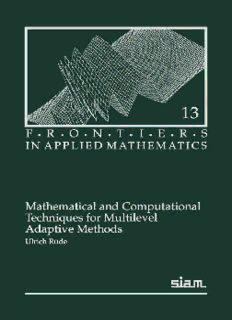Table Of ContentMathematical and Computational
Techniques for Multilevel
Adaptive Methods
Frontiers in Applied Mathematics
Frontiers in Applied Mathematics is a series that presents new mathematical or
computational approaches to significant scientific problems. Beginning with Volume
4, the series reflects a change in both philosophy and format. Each volume focuses on
a broad application of general interest to applied mathematicians as well as engineers
and other scientists.
This unique series will advance the development of applied mathematics through
the rapid publication of short, inexpensive books that lie on the cutting edge of research.
Frontiers in Applied Mathematics
Vol. 1 Ewing, Richard E., The Mathematics of Reservoir Simulation
Vol. 2 Buckmaster, John D., The Mathematics of Combustion
Vol. 3 McCormick, Stephen F., Multigrid Methods
Vol. 4 Coleman, Thomas F. and Van Loan, Charles, Handbook for Matrix
Computations
Vol. 5 Grossman, Robert, Symbolic Computation: Applications to Scientific Computing
Vol. 6 McCormick, Stephen F., Multilevel Adaptive Methods for Partial Differential
Equations
Vol. 7 Bank, R. E., PLTMG: A Software Package for Solving Elliptic Partial Differential
Equations. Users' Guide 6.0
Vol. 8 Castillo, Jose E., Mathematical Aspects of Numerical Grid Generation
Vol. 9 Van Huffel, Sabine and Vandewalle, Joos, The Total Least Squares Problem:
Computational Aspects and Analysis
Vol. 10 Van Loan, Charles, Computational Frameworks for the Fast Fourier Transform
Vol. 11 Banks, H.T., Control and Estimation in Distributed Parameter Systems
Vol. 12 Cook, L. Pamela, Transonic Aerodynamics: Problems in Asymptotic Theory
Vol. 13 Rude, Ulrich, Mathematical and Computational Techniques for Multilevel
Adaptive Methods
Mathematical and Computational
Techniques for Multilevel
Adaptive Methods
Ulrich Rude
Technische Universitat Munchen
Society for Industrial and Applied Mathematics
Philadelphia 1993
Library of Congress Cataloging-in-Publication Data
Rude, Ulrich
Mathematical and computational techniques for multilevel adaptive
methods \ Ulrich Rude.
p. cm. — (Frontiers in applied mathematics ; vol. 13)
Includes bibliographical references and index.
ISBN 0-89871-320-X
1. Differential equations, Partial—Numerical solutions.
2. Multigrid methods (Numerical analysis) I. Title. II. Series:
Frontiers in applied mathematics ; 13.
QA377.R87 1993
515'.353—dc20 93-28379
All rights reserved. Printed in the United States of America. No part of this book may be
reproduced, stored, or transmitted in any manner without the written permission of the
Publisher. For information, write to the Society for Industrial and Applied Mathematics, 3600
University City Science Center, Philadelphia, Pennsylvania 19104-2688.
Copyright Copyright © 1993 by the Society for Industrial and Applied
siam., is a registered trademark.
Ergreife die Feder
Das Mogliche ist ungeheuer. Die Sucht
nach Perfektion
zerstort das meiste. Was bleibt
sind Splitter
an denen sinnlos gefeilt wurde.
Friedrich Durrenmatt
This page intentionally left blank
Contents
PREFACE ix
LIST OF FIGURES xi
CHAPTER 1. Introduction 1
1.1 Purpose and motivation 1
1.2 Notation 4
1.3 Basics and model problems 6
CHAPTER 2. Multilevel Splittings 9
2.1 Abstract stable splittings 10
2.2 Finite element spaces 20
2.3 Stable bases 29
2.4 Induced splittings 31
2.5 Multilevel iterations 32
2.6 Multilevel error estimators 32
CHAPTER 3. The Fully Adaptive Multigrid Method 35
3.1 Adaptive relaxation 37
3.2 Algebraic structure 47
3.3 Application of the theory of multilevel splittings 51
3.4 Multilevel adaptive iteration 56
3.5 Analysis of the V-cycle 60
3.6 Hierarchical transformations 61
3.7 Virtual global grids 72
3.8 Robustness 73
3.9 Parallelization 74
3.10 Numerical examples 75
3.11 Perspectives 79
3.12 Historical remark 81
vii
viii CONTENTS
CHAPTER 4. Data Structures 83
4.1 Introduction 83
4.2 Finite element meshes 85
4.3 Special cases 94
4.4 Adaptive techniques 101
4.5 Hierarchical meshes 111
4.6 Implementation using C++ 122
REFERENCES 129
INDEX 135
Preface
This monograph is an attempt to present the basic concepts of fully adaptive
multilevel methods, including their mathematical theory, efficient algorithms,
and flexible data structures. All these aspects are important to obtain
successful results for practical problems. Additionally, I hope to show with
this book that a unified approach combining these aspects leads to many new
insights.
Multilevel adaptive methods have evolved rapidly over the last decade,
and the development has reached a point where the different aspects of the
discipline are finally coming together. This book is meant to be a reflection
of this maturing discipline. However, the attempt to present all components
of adaptive methods from functional analysis to software engineering within
limited space and time has forced me to make compromises. Therefore, I
have tried to simplify the material by concentrating on instructive prototype
cases instead of representing the full generality of the ideas. The reader may
also be warned that, despite my attempts towards unification, the theoretical
foundation of multilevel methods in approximation theory requires a scientific
language that is different from what is needed to discuss the benefits of
object-oriented programming for these methods. Nevertheless, I hope that
the selection of topics and the style of representation will be useful to anyone
interested in multilevel adaptive methods.
The theory of multilevel methods has been studied systematically for
almost three decades, with many papers appearing on the subject, especially
in the past few years. It has therefore become difficult for one person to follow
all of the different developments. In this monograph, I attempt to present a
theoretical foundation of multilevel methods that fits especially well into my
view of adaptive methods. In the references, I have included pointers to topics
beyond the scope of this book, as they are accessible to me at the time of
writing.
Many fewer publications are available on data structures for multilevel
methods, and most of of them are limited to the implementation of special
adaptive strategies. My approach attempts to go beyond this, because I believe
that ultimately a more general, abstract treatment of the computing aspects
ix
Description:Multilevel adaptive methods play an increasingly important role in the solution of many scientific and engineering problems. Fast adaptive methods techniques are widely used by specialists to execute and analyze simulation and optimization problems. This monograph presents a unified approach to adap

